
 In preparation for writing your family mission statement:
In preparation for writing your family mission statement:
• You’ve considered what’s been holding you back
• You’ve let excuses go or come up with strategies to overcome any real roadblocks
• You’ve been doing creative work on your own – “What do I want my family to do or know” list.
Now it’s time for everyone else to get involved. The next steps will likely be more effective if you take the time to do them over a few days or weeks. Don’t try to do it all at once. The idea is to keep the “fun” flowing.
I. Getting Creative Together
Start your family mission statement experience by getting the creative juices flowing. Before you jump into the writing portion, spend some time getting your family engaged with the idea of what a family mission statement is and what it contains. Use activities that allow everyone to privately consider what they think should be part of the family culture, and how they want it to feel in their family. Here are some ideas to get ideas flowing and help everyone feel involved.
A. The Core Values Box
Core values are simply people, activities, beliefs, skills, or things that matter most to us. Core values range from concepts like love and acceptance to material things like a home. Other examples are things like caring for animals, honesty, entrepreneurialism, freedom, wise money management, or education, etc.
As a family, decorate a Core Values box and put it in a prominent location in your home, like your dining table. You could design it like a collage with pictures that identify things your family values, or everyone can take a side to decorate however they wish. The idea is to get everyone engaged with the Core Values box.
During your activity and throughout the week, everyone will put core value ideas in the box as the ideas come to them. Then during your mission statement development activity, you will open this box and use the ideas inside to create your first draft.
B. Core Values Collages
Gather magazines and other materials to be used to create collages. Pictures could be printed from the internet. Each person will make their own collage. Use words and images which depict how they want the family to feel and the core values that should become part of the family’s culture. Hang the pictures up in a prominent area so you can ponder them through the week.
During your mission statement development activity, give everyone some time to describe the meaning of the items on their collage. Have someone writing down all of the ideas that are shared which will help you create your first draft.
C. Core Values Artwork
If you have younger children, it might be more useful to create drawings or paintings that help your children describe their feelings about their family. Again, put these pictures in an area that will allow them to be seen, and ask your children often to explain the things they have drawn.
II. Getting Deeper Together
You’ve taken the time to get some creativity flowing. Your family members have begun to engage with the idea of how they want their family to feel. You have considered the elements of family culture that are important to your family. Now it’s time to start asking the right questions to help deepen the articulation of the things that your family values.
Gather your family together for a question and answer activity. You can have each member write down their answers or have an open discussion with someone assigned as a scribe to capture each person’s ideas.
Below is a list of various questions. Choose the ones that best fit your family or make up your own. If you have very young children, make sure your questions are age-appropriate.
Questions to consider when developing a family mission statement
1. What makes you happy? What are those things in life that put a smile on your face and get you through your difficult days?
2. What makes us fulfilled? What are those things in life that bring us the most satisfaction and leave us with a feeling of completeness?
3. What do we want for ourselves and our family? What are our hopes, dreams, and aspirations, not only for our family but for ourselves as well?
4. What is most important to you about your family?
5. What are your collective goals?
6. When do you feel most connected?
7. How would you like to relate to one another?
8. Describe your family’s strengths.
9. Describe your family in 5 years, 10 years, or 15 years.
10. What do you value? (For example, relationships, faith, independence, wealth, hard work, generosity)
Want more question examples?
1. We are at our best when _______?
2. We are at our worst when________?
3. What do we love to do together?
4. As a family, what can we better do to help each other?
5. As a family, what can we contribute to others, or how can we help others outside our family?
6. Are there things we should be doing or changing as a family, even though we’ve dismissed such thoughts many times? What are these things?
7. Imagine a party celebrating our family 20 years from now. What do we want people to say about our family honestly? People view our family as:
8. What one emotion would we like most to fill our home?
9. What are the principles that operate in our family? (Such as trust, honesty, kindness, service, etc.)
10. Let’s think of balance as a state of fulfillment and renewal in each of the four dimensions: physical, spiritual, mental, and social/emotional. What are the most important things we can do, in each of these areas, to have the most significant positive impact and help us achieve a sense of balance?
Physical:
Spiritual:
Mental:
Social/Emotional:
11. Imagine its ten years in the future. Envision where we want each member of our family to be. What have we accomplished; how do we see ourselves? Who will you be in 10 years?
III. Getting it Down Together
Finally, it’s time to start organizing your ideas into a concrete form. Don’t allow this family activity to breakdown over “word-smithing” details. Later you will assign someone, usually mom or dad, the job of designing the final draft to bring back to the family for approval.
The easiest way to begin getting your family mission statement down is to choose a design formula that feels right for your family. Mom and dad should choose the formula before this activity begins. Although there are many different forms that mission statements can take, here are three basic forms you could choose from.
FORMULA #1
Gather together all of the core values you’ve identified as a family. Decrease these by two, then decrease by two again until you have one final core value. Keep track of your last 4-6 subsequent core values and then insert them into the formula below.
To (insert Central Core Value here) by (insert three to five Subsequent Core Values here).
EXAMPLE
Our Family Mission
To encourage others to become like Christ through loving relationships,
healthy lifestyles, and stimulating experiences.
FORMULA #2
To…. (Do something)
In such a way that….. (Quality of action)
So that…. (We gain these results or benefits)
EXAMPLE
Our Family Mission
To realize our dreams, goals, and aspirations as a family and as individuals in a way that stretches our intellect, enriches our Christian faith, strengthens our character, and enriches our family life. So that we are fulfilled, happy, confident, and always close.
FORMULA #3
Just create a big list of the things that matter to you. Use words such as “are” and “is” rather than terms that suggest “will be.”
EXAMPLE
The Olsen Family Mission Statement
· We love and obey God with all our heart, soul, mind, and strength.
· We celebrate our family’s faith, heritage, and traditions.
· We show our love for one another in word and deed; we pray for each other; we are courteous, caring, positive, supportive, and considerate.
· We live a healthy lifestyle and maintain order and cleanliness in the home.
· We raise up children in the way they should go, making learning together an integral part of daily life with books and enriching experiences.
· We optimize the competing forces in our lives for good: health, wealth, aesthetics, rest, exercise, recreation, work, skills, and knowledge.
· We enjoy life today and live it fully; we accept the wonderful gifts from God: forgiveness of sins and eternal life through the sacrifice of His Son.
· We are wise in the way we use our time, talents, and money; we establish good habits, help others, and teach them the truth of God’s salvation.
· We contribute something of worth to the community; maintain the environment, mankind’s institutions, and religious, political, cultural, social, and individual freedoms, all to glorify God.
Our family felt most connected to the Big List.
Here is our family mission statement.
The Palmer Family Mission Statement
The Joyful Palmers are a Team! Yeah!
We love, create, and protect family time, both one-one and everyone together.
We talk about our needs, thoughts, and feelings, and we carefully listen to each other.
We treat each other with respect, patience, and kindness.
We speak and act in a way that allows the Spirit to be with us.
We nurture, support, and celebrate each other’s ambitions, dreams, and missions.
We are always honest and do the right thing even when no one is looking.
We courageously commit to public virtue.
We know that God loves us, and we are wonderful and amazing!
We build our knowledge, skills, and attitudes of self-reliance and freedom.
We make everything around us better and more beautiful.
We build others up through service, sharing, and love.
We protect our home, and the Spirit dwells here.
We learn, live, and share the gospel of Jesus Christ.
Love is our compass and our anchor.
IV. The Final Draft
Don’t try to make the final draft as a family. It has the potential of creating too much contention. Once you’ve got the core ideas down, give someone the task of editing and making it sound good. Then it can be brought back to the family for the final unveiling.
Assignment #3: Decide which activities to use to prime your family’s creativity, which questions you will ask, and the form that you want your mission statement to take. Then determine your timeline. As you develop your plan, give special attention to making these activities fun and memorable. Include food, or outings, or whatever will make the events unique for your family.
You can find Part 1 of the series HERE. You can find part 2 of the series HERE.
Please share your family’s mission statement here in the comments section of this blog post. Your example will help other families as they work to create their own family mission statements.
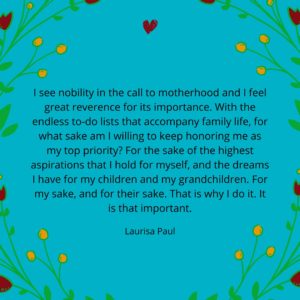 This article was written by a wonderful woman and friend, Laurisa Paul. She is an RN, a writer, homeschool mother of five, and an aspiring midwife. I felt that the topic hits so close to many women’s hearts and experience that it had to be shared. Read, enjoy, and learn.
This article was written by a wonderful woman and friend, Laurisa Paul. She is an RN, a writer, homeschool mother of five, and an aspiring midwife. I felt that the topic hits so close to many women’s hearts and experience that it had to be shared. Read, enjoy, and learn.

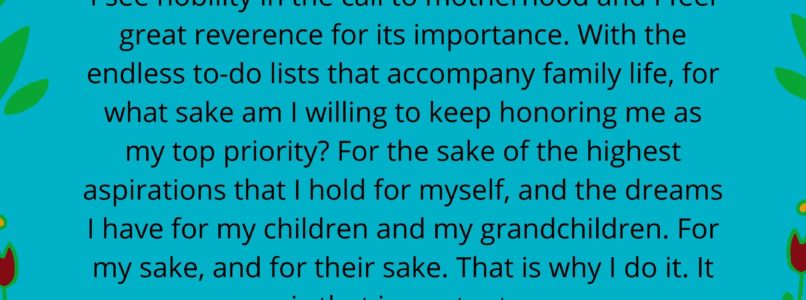


 contained pictures of what I wanted to happen in my life. She must have thought about that for a few days and then she came and asked me to help her make one. She also noticed that I made my bed every morning, and soon she began doing the same. She was only eight or nine, and nobody told her to do it. She saw that I did it and that it was a good thing. She also saw the sayings and affirmations that I have on my walls. If you go into her room, you will notice that she has hopeful and joyful sayings all over the place. When she makes anything or buys anything, she makes sure that the words she loves are on it.
contained pictures of what I wanted to happen in my life. She must have thought about that for a few days and then she came and asked me to help her make one. She also noticed that I made my bed every morning, and soon she began doing the same. She was only eight or nine, and nobody told her to do it. She saw that I did it and that it was a good thing. She also saw the sayings and affirmations that I have on my walls. If you go into her room, you will notice that she has hopeful and joyful sayings all over the place. When she makes anything or buys anything, she makes sure that the words she loves are on it.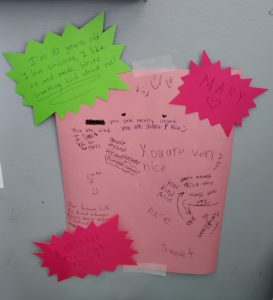 One day, about a year ago, she said, “Grandma, you and I am the same.” You know she is right. I work to remain in
One day, about a year ago, she said, “Grandma, you and I am the same.” You know she is right. I work to remain in 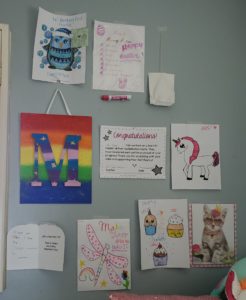 Our example to our children matters. If we feel like victims and live our lives as if we are, our children will see that and follow suit. If we blame and criticize, so will our kids. If we talk poorly to ourselves, then how can our children believe that they are any better. We can’t and won’t be perfect people or parents, but what will last and impact our children the most is when they see us growing. There is power in understanding and believing that you are 100% in control of your life. You may not be able to control all the circumstances, but
Our example to our children matters. If we feel like victims and live our lives as if we are, our children will see that and follow suit. If we blame and criticize, so will our kids. If we talk poorly to ourselves, then how can our children believe that they are any better. We can’t and won’t be perfect people or parents, but what will last and impact our children the most is when they see us growing. There is power in understanding and believing that you are 100% in control of your life. You may not be able to control all the circumstances, but 


 Congratulations on creating your family mission statement! However, for it to translate into a family culture, you must now use it. Here are some ideas to engage with your family mission statement in meaningful ways.
Congratulations on creating your family mission statement! However, for it to translate into a family culture, you must now use it. Here are some ideas to engage with your family mission statement in meaningful ways.
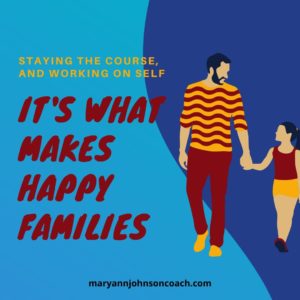 As I was raising our children, I made many mistakes. I was not gentle enough. I was a yeller. Sometimes I did not listen. I could be stern.
As I was raising our children, I made many mistakes. I was not gentle enough. I was a yeller. Sometimes I did not listen. I could be stern.

 In preparation for writing your family mission statement:
In preparation for writing your family mission statement:

 For many of you, developing a family mission statement may have been on your “to-do” list for a long time, but you have never gotten around to it. Or, maybe the idea is new and a bit daunting.
For many of you, developing a family mission statement may have been on your “to-do” list for a long time, but you have never gotten around to it. Or, maybe the idea is new and a bit daunting.



 Sometimes, as a parent, we’re handed opportunities for self-evaluation on a silver platter. I was given such a dish the other day when I caught my two-year-old son marching around the living room chanting, “Stop that! Now I have to take that away. Stop that! Now I have to take that away.” Good grief! I’m happy to contrast that little ditty with something he was muttering in my ear a few nights ago as I was putting him to sleep. “Daddy loves you; daddy loves you; daddy loves you.”
Sometimes, as a parent, we’re handed opportunities for self-evaluation on a silver platter. I was given such a dish the other day when I caught my two-year-old son marching around the living room chanting, “Stop that! Now I have to take that away. Stop that! Now I have to take that away.” Good grief! I’m happy to contrast that little ditty with something he was muttering in my ear a few nights ago as I was putting him to sleep. “Daddy loves you; daddy loves you; daddy loves you.”
 A friend has been talking with me about her efforts to organize her family and teach her sons. We’ve had conversations, each ending with something to ponder. The goal is to come up with an experiment.
A friend has been talking with me about her efforts to organize her family and teach her sons. We’ve had conversations, each ending with something to ponder. The goal is to come up with an experiment.
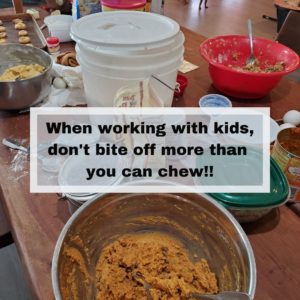 Keep It Simple
Keep It Simple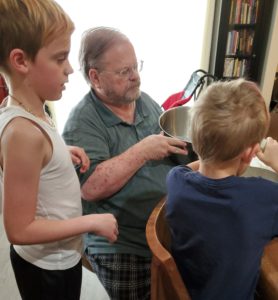 reasoned that he could help the two boys, one 12 and one 6. The 12-year-old wouldn’t need much help. I would help the girls, one 10 and one 14, with special needs. The 10-year-old is creative and fairly independent. That should work out alright.
reasoned that he could help the two boys, one 12 and one 6. The 12-year-old wouldn’t need much help. I would help the girls, one 10 and one 14, with special needs. The 10-year-old is creative and fairly independent. That should work out alright.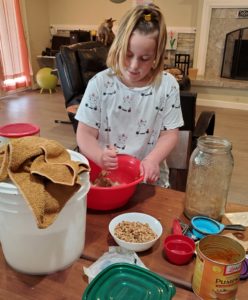 NOT! Don couldn’t manage two at a time and was totally involved with the six-year-old. That left me with three. As for the twelve-year-old, I discovered that when it comes to cooking, he needed a lot of help. And as far as the 10-year-old goes, she couldn’t read my cursive. Of course, her recipe card was in my cursive. Sigh. It was like trying to wrangle chickens. You’ve never done that. Well, trust me, it’s tiring!! And here is another thing. I am perfectly aware that expectations can do a good project in. I teach that. I am an expert.
NOT! Don couldn’t manage two at a time and was totally involved with the six-year-old. That left me with three. As for the twelve-year-old, I discovered that when it comes to cooking, he needed a lot of help. And as far as the 10-year-old goes, she couldn’t read my cursive. Of course, her recipe card was in my cursive. Sigh. It was like trying to wrangle chickens. You’ve never done that. Well, trust me, it’s tiring!! And here is another thing. I am perfectly aware that expectations can do a good project in. I teach that. I am an expert.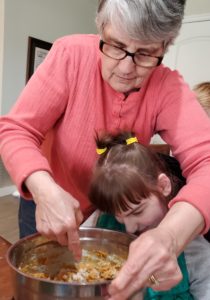 cream the sugar and shortening, no problem. Then they will cook their cookies, we will eat some and each will clean up their spot on the table. WHAT WAS I THINKING!!!
cream the sugar and shortening, no problem. Then they will cook their cookies, we will eat some and each will clean up their spot on the table. WHAT WAS I THINKING!!!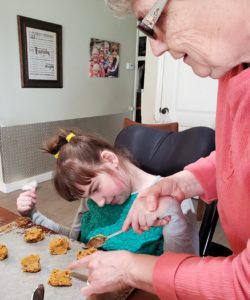 I have to say, that
I have to say, that